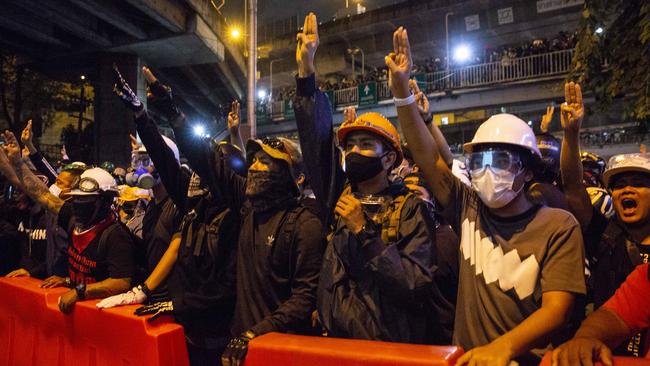Thai protesters turn on PM’s offer to lift emergency controls
Thai pro-democracy protesters reject PM’s offer to lift the state of emergency in exchange for an end to to nightly protests.

Thailand’s pro-democracy protesters have met Prime Minister Prayuth Chan-o-cha’s offer to lift the country’s “severe” emergency decree in exchange for an end to nightly rallies with a defiant ultimatum, demanding the former junta leader step down within three days.
General Prayuth said on Wednesday night he was prepared to “make the first move to de-escalate this situation” if youth protesters toned down their “hateful and divisive speeches”.
“I am currently preparing to lift the state of severe emergency in Bangkok and will do so promptly if there are no violent incidents. Let us respect the law and parliamentary democracy, and let our views be presented through our representatives in parliament,” he said in a televised broadcast, referring to next Monday’s special parliamentary session to try to defuse the most serious challenge to the government in years.
Thailand’s youth protesters have defied the emergency decree imposed last week by gathering nightly in their tens of thousands in Bangkok and other cities to demand General Prayuth’s resignation, a democratic constitution and — most controversially — reform of the monarchy.
The emergency order, which banned gatherings of more than four people, was subsequently lifted at noon on Thursday, a week after it was imposed to little effect.
Within hours of the Prime Minister’s Wednesday night appeal, protesters marched to Government House to demand the release of the remaining 27 of the more than 80 arrested under the emergency decree and to hand to an aide a giant resignation letter for General Prayuth.
It read; “As I, Prayut Chan-ocha, have abused my authority, bought electoral votes, coerced a bandit constitution draft, bargained for my interests and jobs, and used the royal institution as an excuse to obtain my position as a prime minister.
“In order to protect the honour of my family, of the prime minister, of the nation, and to show respect to the people to whom sovereignty belongs, I would like to resign as prime minister.”
Outside General Prayuth’s offices, protesters also issued their ultimatum over loudspeaker.
“If he doesn’t resign within three days he will face the people again,” student protest leader Patsaravalee Tanakitvibulpon announced. Two hours later, she too was arrested. She was released on Thursday.
The government has looked increasingly powerless in the face of demonstrations by Thai youth — many of them still in their teens — who see little future in a country run by a military-backed government they say has mismanaged the economy and gamed the constitution to hold onto power.
Thailand’s economy, already in bad shape before the coronavirus pandemic, is one of the region’s worst-hit.
The country is already ranked one of the world’s most unequal, with just 1 per cent of people controlling two-thirds of its wealth, though King Vajiralongkorn is easily Thailand’s wealthiest person, since transferring more than $US40bn worth of crown property assets into his name following the 2017 death of his father, King Bhumibol.
His opulent lifestyle has rankled with many Thais suffering under the worst economic contraction in decades, and fuelled protester demands for a cap on the royal budget.
Support for the youth protesters has grown, after authorities turned water cannons against peaceful demonstrators last Friday night. On Wednesday, dozens of university lecturers demanded an end to the use of state violence against protesters in a petition which also called for the lifting of the decree. They warned of a nationwide academic strike unless their demands were met.
Thailand’s Criminal Court also dealt a blow to government suppression efforts by repealing an order to close down Voice TV, which has been live-broadcasting the protests, and rejecting a request to block three other online news sites.
Thailand-based analyst David Streckfuss told The Australian it was clear the government did not know how to handle the crisis, judging by its attempts to muzzle a media which seamlessly shifted online, and from its efforts to organise simultaneous, pro-royalist, “Yellow Shirt” rallies on Wednesday.
“They haven’t been able to figure out even how to characterise these protests and they don’t have a clear enemy,” Dr Streckfuss said. “With the Red Shirts, they had some way of justifying their crackdown by saying (ousted prime minister) Thaksin was behind it, and the protesters were carrying crude arms.
“In this case, the students are armed with umbrellas and cell phones, and there is no bad guy to hang this around.”
Past protest movements in Thailand have ended in deadly suppression, most recently in 2010, when 85 people were killed during a Thai military crackdown on Red Shirt rallies in Bangkok.




To join the conversation, please log in. Don't have an account? Register
Join the conversation, you are commenting as Logout